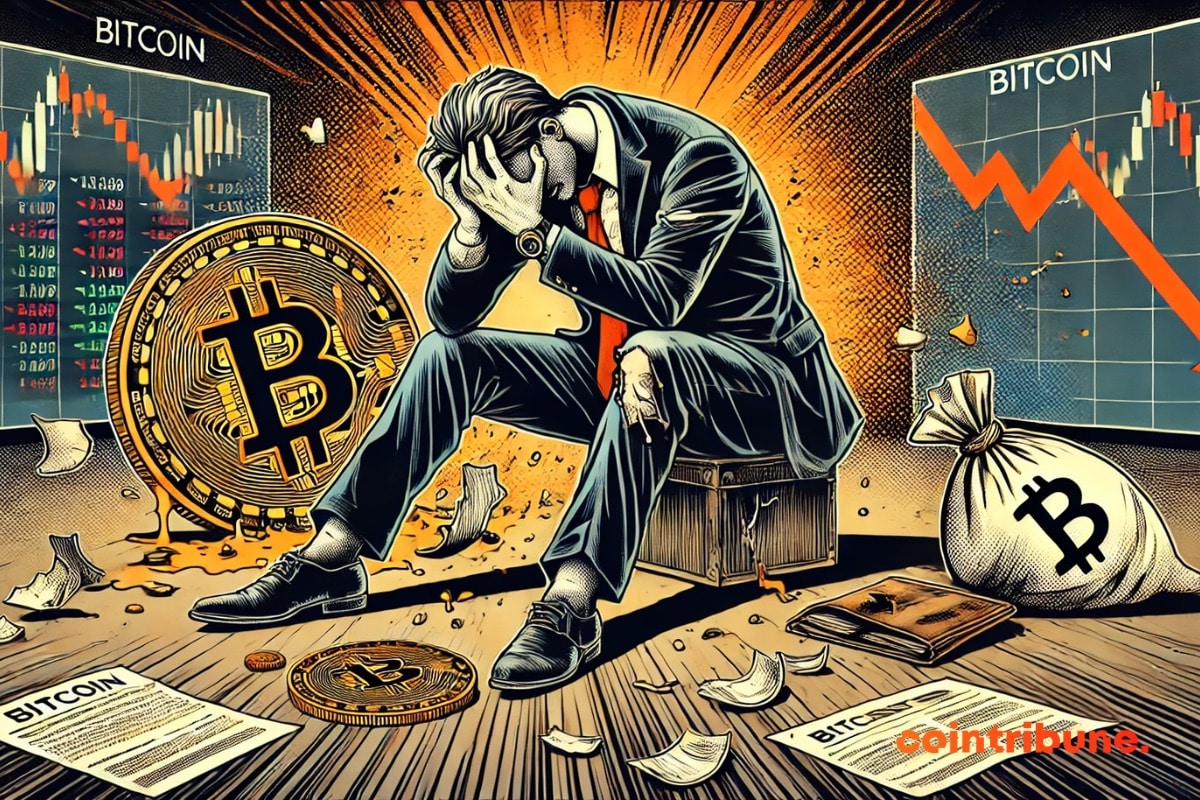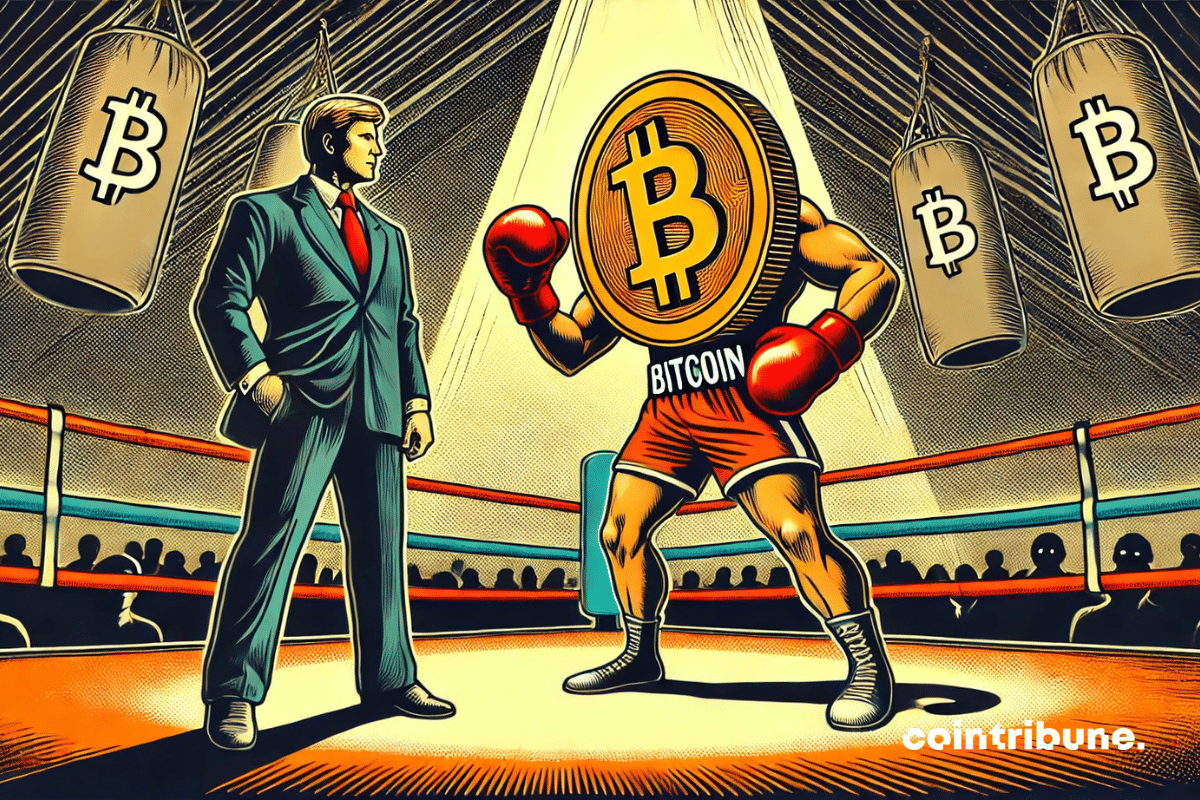Crypto ETFs are crashing down like an uncontrollable wave. Avalanche joins the dance, but history has taught us that markets sometimes have a short memory... and a brutal correction.
Theme Bitcoin (BTC)
Bitcoin continues to challenge traditional financial markets and generates increasing interest among investors. For several years, it has been compared to gold, often presented as its digital equivalent. But this time, Tom Lee, influential analyst and co-founder of Fundstrat, goes further and claims that Bitcoin will become the best-performing asset.
A wind of dissent is blowing over Washington. A legislator is directly confronting Donald Trump's initiative to create a strategic reserve of Bitcoin and other cryptocurrencies. For him, this project is nothing visionary: it is more of a dubious maneuver, built on unstable ground where private interests and public funds intertwine.
A wave of panic is sweeping through the bitcoin market. In just six weeks, short-term investors have lost over 100 million dollars, caught in a brutal correction. Should this be seen as a worrying signal or a disguised opportunity for savvy investors?
The traditional financial industry and the crypto sector continue to intersect, and every move of Wall Street giants is scrutinized closely. Indeed, the announcement of BlackRock's return to the bitcoin (BTC) market with a $25 million investment has not gone unnoticed.
Moscow is stepping up now that Washington has embraced bitcoin. Soon a Russian strategic reserve?
Bitcoin is going through a period of indecision. After reaching a peak of $109,000 in January 2025, its price dropped to $84,290, marking a correction of 23%. Some analysts believe that the leading cryptocurrency could enter a new 8-month consolidation phase, a pattern similar to what was observed in 2024. This hypothesis is based on several technical indicators and the behavior of institutional investors.
A tiny device challenging the monsters of Bitcoin mining, a chance worthy of a miracle, and there is a solitary miner pocketing $260,000 under the astonished gaze of the industry.
Bitcoin exchange-traded funds have maintained over 95% of their invested capital, despite a slowdown in inflows and a recent significant drop in price. This resilience, comparable to that of traditional stock ETFs, reflects a change in the behavior of crypto investors.
Ethereum in free fall against Bitcoin: mere turbulence or alarm signal? As the ETH/BTC ratio hits its lowest level in 5 years, some traders are fleeing to more profitable altcoins. Should we follow the trend or wait for a rebound? Discover the analyses and strategies to not miss the next crypto wave!
According to the latest financial statements made public, at least six members of Donald Trump's presidential cabinet hold investments in bitcoin, with a combined total value reaching several million dollars. This revelation aligns perfectly with the president's promise to make the United States the "global superpower of Bitcoin."
Larry Fink sounds the alarm: Bitcoin could lead to a major crisis. Discover his full analysis in this article!
The crypto market is undergoing a transitional phase, marked by Bitcoin consolidation and stagnation of altcoins. However, several technical indicators suggest that a trend reversal is on the horizon. The $425 billion threshold on the market capitalization of altcoins, which has long been a major obstacle, may soon give way, paving the way for a surge in alternative assets.
The United States is preparing to accumulate millions of bitcoins. Goal: to lighten the burden of debt.
Bitcoin strengthens its hegemony in the crypto market, reaching a dominance of 61.2% according to recent data. This rise confirms the weariness of the recent altcoin rally, weakened by macroeconomic volatility. In the face of an uncertain context, investors are refocusing on BTC, perceived as a safe haven.
In the arena of Bitcoin, the giants play at their discretion while the newcomers flee. Binance watches, powerless, this grand ball of decentralized finance. End of the game or just an intermission?
The financial systems encountered significant disturbances at the start of 2025 after President Donald Trump enacted extensive import tariffs affecting Canada, Mexico, and China. President Trump initiated the new trade regulations, which imposed 25% duties on products from Canada and Mexico and 10% duties on Chinese exports to safeguard domestic businesses and correct commercial discrepancies. The tariffs caused disruptive effects throughout world markets, particularly in the cryptocurrency industry.
As the U.S. Consumer Price Index (CPI) shows a slight decline in inflation, Bitcoin holds its breath. At 3.1%, the number is below expectations, but the king of crypto paradoxically plunges from $84,000 to $83,000 in just a few hours. A paradox? Not really. Between hopes for interest rate cuts and political maneuvering, the landscape is becoming more complex. An analysis of a scenario where Bitcoin, lying in wait, could surprise the markets.
The U.S. Securities and Exchange Commission (SEC) may soon abandon its initiative to require certain crypto companies to register as exchanges. Mark Uyeda, acting chairman of the SEC, has asked the agency's teams to explore ways to waive this regulatory change.
As cryptocurrencies reshape the boundaries of finance, the United States takes a historic step. The Bitcoin Act of 2025, submitted to the House of Representatives, proposes to create a strategic reserve of one million BTC over two decades. A bold maneuver, blending financial innovation and geopolitical vision. Far from being a simple accumulation of digital assets, this project embodies a strategic realignment in the face of digital gold. Explanations.
As Bitcoin hovers around $81,000, a massive transfer of nearly 12,000 BTC by the former defunct giant reignites speculation. Between the psychology of the players and invisible market mechanisms, a breakdown of a tremor that recalls the fragility of an ecosystem still marked by its ghosts. Did Mt. Gox just…
A bitcoin at $70K? Nothing to faint over! The market dances, retracts, but doesn't stumble. Those who wait will see the next act of the show.
Bitcoin has plunged to $76,700, marking its lowest level in four months amid global economic turmoil. Indeed, the 30% drop from its all-time high of $109,350 has reignited discussions about a possible trend reversal, as some observers question the sustainability of the bullish cycle. However, several indicators suggest that this correction could represent a strategic entry point for investors. On one hand, financial markets remain under pressure with persistent economic uncertainties, while on the other hand, the BTC derivatives market shows unexpected strength. So, has Bitcoin reached its ultimate floor before a rebound?
As the United States embraces bitcoin, Europe bogs down by continuing to promote the dystopia of the digital euro.
Financial and crypto markets continue to experience severe declines as investors await inflation data and the FED's decisions. Despite favorable regulatory advancements, Bitcoin and Ethereum are falling, in hope of a relief that will certainly come from the upcoming CPI and FOMC data. But what will it really be?
Peter Schiff, a well-known advocate for gold and a fierce critic of Bitcoin, did not miss the opportunity to mock crypto investors following the recent drop in prices. As Bitcoin lost nearly 30% of its value in just a few weeks, the economist threw out a provocative jab on social media.
Crypto: Banking giant BBVA gets the green light to offer Bitcoin and Ether. Find out the details in this article!
Time no longer has control over the crypto markets. Coinbase has just broken free from fixed hours by announcing 24/7 trading of futures contracts on Bitcoin and Ethereum for American residents. This is a revolution that, beyond simplifying access, redefines the rules of the game in the face of fierce competition. But behind this boldness lie subtle stakes: regulation, technical innovation, and a battle to dominate a rapidly growing derivatives market.
Strategy's CEO, Michael Saylor, is planning a massive fundraising to continue accumulating Bitcoin. Already holding nearly 500,000 BTC, the company is launching an ambitious "ATM Program" that could transform the market.
European lawmakers maintain an intriguing silence in the face of Donald Trump's executive order aimed at creating a strategic reserve of bitcoin in the United States. While this decision marks a major turning point in global monetary policy, the lack of response in Europe raises questions: mere indifference or a response in preparation?





























